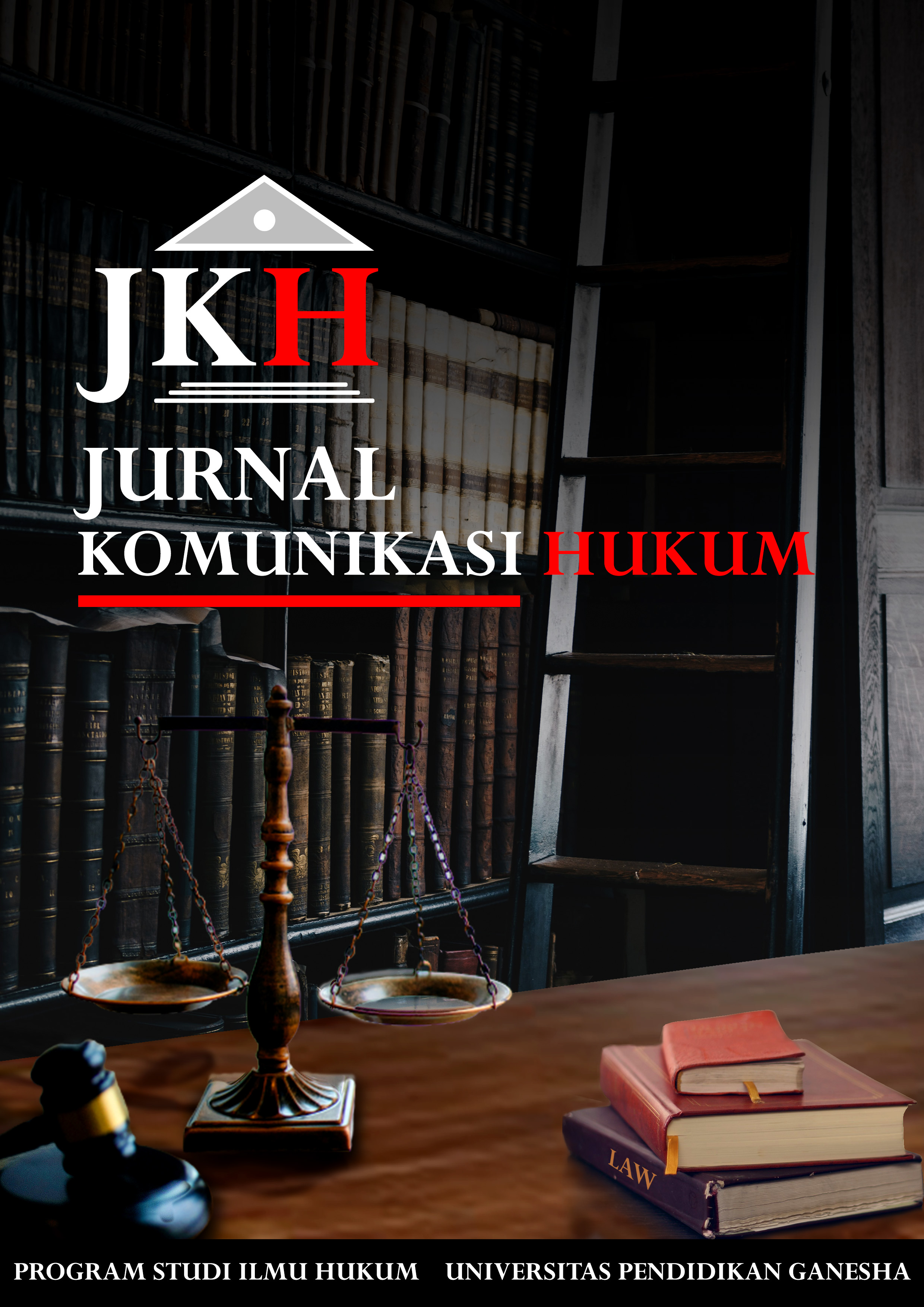LEGAL IMPLICATIONS OF MSME REGULATION ON THE CONDITIONALLY UNCONSTITUTIONAL JOB CREATION LAW
DOI:
https://doi.org/10.23887/jkh.v8i1.44406Keywords:
UMKM, Omnibus Law, Implikasi Hukum, InkonstitusionalAbstract
Beberapa ketentuan UU UMKM ini pernah dirubah melalui UU Cipta Kerja. UU Cipta Kerja ini menciptakan suatu kegiatan UMKM yang kompetitif dan memajukan. Seluruh pasal-pasal dalam UU Cipta Kerja tidak hanya mengarah pada kepentingan elit atau kapitalis melainkan, adanya suatu hal positif dalam pengaturan UMKM. Khususnya, izin usaha bagi UMKM di Indonesia. UU Cipta Kerja disebut memiliki beberapa manfaat yang membantu mempermudah akses perizinan, akses rantai pasok, akses pengembangan usaha, akses pembiayaan dan akses pasar. Namun, berdasarkan Putusan Mahkamah Konstitusi Nomor 91/PUU-XVIII/2020, Mahkamah Konstitusi memutuskan bahwa UU Cipta Kerja tidak sesuai konstitusi atau inkonstitusional bersyarat. Dalam konteks teori hukum progresif, metode pembentukan undang-undang melalui metode omnibus law tidak mempermasalahkan nilai baik atau pun buruk. Karena omnibus law adalah suatu metode yang bebas nilai. Oleh karena itu metode pembentukan undang-undang dengan metode omnibus law dapat diadopsi dan cocok diterapkan dalam konsepsi negara hukum Pancasila sepanjang omnibus law itu dibuat sesuai dan tidak bertentangan dengan nilai-nilai Pancasila dan prinsip- prinsip yang termuat dalam UUD NRI 1945. Penelitian ini menggunakan metode penelitian hukum doctrinal. Penelitian ini dinilai urgensi dan memiliki kebaharuan. Selain belum adanya penelitian terkait ini, penelitian mengenai implikasi hukum pegaturan UMKM terhadap adanya Putusan Mahkamah Konstitusi Nomor 91/PUU-XVIII/2020 dapat berkontribusi baik secara praktis dan teoritis. Hasil penelitian ini menunjukan bahwa, berdasarakan Putusan Mahkamah Konstitusi pengaturan UMKM yang terdapat pada UU Cipta Kerja mempunyai kekuatan hukum mengikat secara bersyarat sepanjang UU Cipta Kerja dilakukan perbaikan dalam waktu 2 (dua) tahun sejak putusan ini diucapkan. Maka UU Cipta Kerja masih tetap berlaku sampai dengan dilakukan perbaikan pembentukan sesuai dengan tenggang waktu sebagaimana yang telah ditentukan dalam putusan ini. Begitupula dengan pengaturan kriteria UMKM yang terdapat di dalamnya.
Downloads
Published
How to Cite
Issue
Section
License
Authors who publish with this journal agree to the following terms:- Authors retain copyright and grant the journal right of first publication with the work simultaneously licensed under a Creative Commons Attribution License that allows others to share the work with an acknowledgement of the work's authorship and initial publication in this journal.
- Authors are able to enter into separate, additional contractual arrangements for the non-exclusive distribution of the journal's published version of the work (e.g., post it to an institutional repository or publish it in a book), with an acknowledgement of its initial publication in this journal.
- Authors are permitted and encouraged to post their work online (e.g., in institutional repositories or on their website) prior to and during the submission process, as it can lead to productive exchanges, as well as earlier and greater citation of published work (See The Effect of Open Access).
Authors who publish with this journal agree to the following terms:
- Authors retain copyright and grant the journal right of first publication, with the work [SPECIFY PERIOD OF TIME] after publication simultaneously licensed under aCreative Commons Attribution License that allows others to share the work with an acknowledgement of the work's authorship and initial publication in this journal.
- Authors are able to enter into separate, additional contractual arrangements for the non-exclusive distribution of the journal's published version of the work (e.g., post it to an institutional repository or publish it in a book), with an acknowledgement of its initial publication in this journal.
- Authors are permitted and encouraged to post their work online (e.g., in institutional repositories or on their website) prior to and during the submission process, as it can lead to productive exchanges, as well as earlier and greater citation of published work (See The Effect of Open Access).












